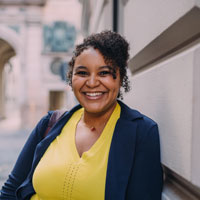Meshell Sturgis, Ph. D.
Assistant Professor, Communication and Journalism
Bio
Dr. Meshell L. Sturgis conducts a fun mixture of critical cultural media studies and community engaged research using research creation methods. She received her B.A. in English from the University of North Carolina at Chapel Hill in 2013, and her M.A. in Cultural Studies from the University of Washington, Bothell. She completed her Ph.D. in Communication at the University of Washington, Seattle in 2024. As her dissertation explored the political aesthetics of Black Girl Magic and self-representation in alternative media, Black feminism and Queer theorizing are central to her work, which you can find published in the Journal for Women’s Studies in Communication, QED, Somatechnics, Lateral, and Souls. Her critical arts writing practice has led to publications in Art Practical, A Year in Black Art, and New Archives. She enjoys teaching classes on race, gender, and sexuality in the media and encourages students to think beyond the binary.
Why Africana Studies
Barbara Smith, Beverly Smith, and Demitia Frazier of the Combahee River Collective best explain “Why Africana Studies” in a Black Feminist Statement from 1975: “We realize that the only people who care enough about us to work consistently for our liberation is us. Our politics evolve from a healthy love for ourselves, our sisters, and our community which allows us to continue our struggle and work. We believe that the most profound and potentially the most radical politics come directly out of our own identity... If Black women were free, it would mean that everyone else would have to be free since our freedom would necessitate the destruction of all the systems of oppression...” (James and Sharpley-Whiting, 2000, p. 261-270). This is why I am delighted to be an affiliated faculty of the Department of Africana Studies. I see such affiliation as a political action that contributes to the movement for liberation of Black folks on campus, in New Mexico, across the US, and worldwide through the development and fostering of an educational curriculum and commitment that centers our experiences and insight for change as people of the African Diaspora.

